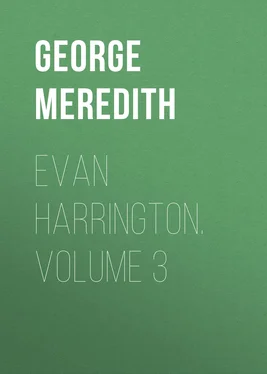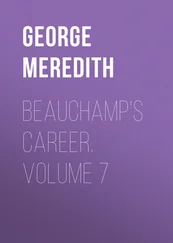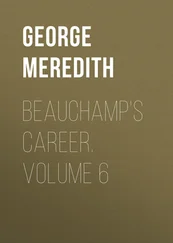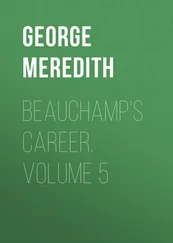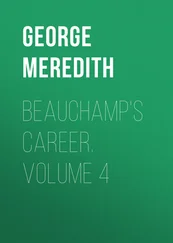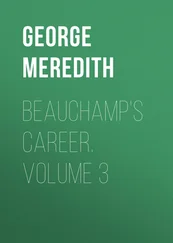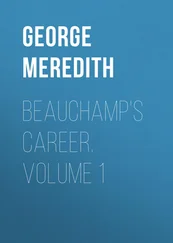George Meredith - Evan Harrington. Volume 3
Здесь есть возможность читать онлайн «George Meredith - Evan Harrington. Volume 3» — ознакомительный отрывок электронной книги совершенно бесплатно, а после прочтения отрывка купить полную версию. В некоторых случаях можно слушать аудио, скачать через торрент в формате fb2 и присутствует краткое содержание. Жанр: foreign_prose, literature_19, foreign_antique, на английском языке. Описание произведения, (предисловие) а так же отзывы посетителей доступны на портале библиотеки ЛибКат.
- Название:Evan Harrington. Volume 3
- Автор:
- Жанр:
- Год:неизвестен
- ISBN:нет данных
- Рейтинг книги:3 / 5. Голосов: 1
-
Избранное:Добавить в избранное
- Отзывы:
-
Ваша оценка:
- 60
- 1
- 2
- 3
- 4
- 5
Evan Harrington. Volume 3: краткое содержание, описание и аннотация
Предлагаем к чтению аннотацию, описание, краткое содержание или предисловие (зависит от того, что написал сам автор книги «Evan Harrington. Volume 3»). Если вы не нашли необходимую информацию о книге — напишите в комментариях, мы постараемся отыскать её.
Evan Harrington. Volume 3 — читать онлайн ознакомительный отрывок
Ниже представлен текст книги, разбитый по страницам. Система сохранения места последней прочитанной страницы, позволяет с удобством читать онлайн бесплатно книгу «Evan Harrington. Volume 3», без необходимости каждый раз заново искать на чём Вы остановились. Поставьте закладку, и сможете в любой момент перейти на страницу, на которой закончили чтение.
Интервал:
Закладка:
George Meredith
Evan Harrington – Volume 3
CHAPTER XIV
THE COUNTESS DESCRIBES THE FIELD OF ACTION
Now, to clear up a point or two: You may think the Comic Muse is straining human nature rather toughly in making the Countess de Saldar rush open-eyed into the jaws of Demogorgon, dreadful to her. She has seen her brother pointed out unmistakeably as the tailor-fellow. There is yet time to cast him off or fly with him. Is it her extraordinary heroism impelling her onward, or infatuated rashness? or is it her mere animal love of conflict?
The Countess de Saldar, like other adventurers, has her star. They who possess nothing on earth, have a right to claim a portion of the heavens. In resolute hands, much may be done with a star. As it has empires in its gift, so may it have heiresses. The Countess's star had not blinked balefully at her. That was one reason why she went straight on to Beckley.
Again: the Countess was a born general. With her star above, with certain advantages secured, with battalions of lies disciplined and zealous, and with one clear prize in view, besides other undeveloped benefits dimly shadowing forth, the Countess threw herself headlong into the enemy's country.
But, that you may not think too highly of this lady, I must add that the trivial reason was the exciting cause—as in many great enterprises. This was nothing more than the simple desire to be located, if but for a day or two, on the footing of her present rank, in the English country- house of an offshoot of our aristocracy. She who had moved in the first society of a foreign capital—who had married a Count, a minister of his sovereign, had enjoyed delicious high-bred badinage with refulgent ambassadors, could boast the friendship of duchesses, and had been the amiable receptacle of their pardonable follies; she who, moreover, heartily despised things English:—this lady experienced thrills of proud pleasure at the prospect of being welcomed at a third-rate English mansion. But then, that mansion was Beckley Court. We return to our first ambitions, as to our first loves not that they are dearer to us, —quit that delusion: our ripened loves and mature ambitions are probably closest to our hearts, as they deserve to be—but we return to them because our youth has a hold on us which it asserts whenever a disappointment knocks us down. Our old loves (with the bad natures I know in them) are always lurking to avenge themselves on the new by tempting us to a little retrograde infidelity. A schoolgirl in Fallow field, the tailor's daughter, had sighed for the bliss of Beckley Court. Beckley Court was her Elysium ere the ardent feminine brain conceived a loftier summit. Fallen from that attained eminence, she sighed anew for Beckley Court. Nor was this mere spiritual longing; it had its material side. At Beckley Court she could feel her foreign rank. Moving with our nobility as an equal, she could feel that the short dazzling glitter of her career was not illusory, and had left her something solid; not coin of the realm exactly, but yet gold. She could not feel this in the Cogglesby saloons, among pitiable bourgeoises—middle-class people daily soiled by the touch of tradesmen. They dragged her down. Their very homage was a mockery.
Let the Countess have due credit for still allowing Evan to visit Beckley Court to follow up his chance. If Demogorgon betrayed her there, the Count was her protector: a woman rises to her husband. But a man is what he is, and must stand upon that. She was positive Evan had committed himself in some manner. As it did not suit her to think so, she at once encouraged an imaginary conversation, in which she took the argument that it was quite impossible Evan could have been so mad, and others instanced his youth, his wrongheaded perversity, his ungenerous disregard for his devoted sister, and his known weakness: she replying, that undoubtedly they were right so far: but that he could not have said he himself was that horrible thing, because he was nothing of the sort: which faith in Evan's stedfast adherence to facts, ultimately silenced the phantom opposition, and gained the day.
With admiration let us behold the Countess de Saldar alighting on the gravel sweep of Beckley Court, the footman and butler of the enemy bowing obsequious welcome to the most potent visitor Beckley Court has ever yet embraced.
The despatches of a general being usually acknowledged to be the safest sources from which the historian of a campaign can draw, I proceed to set forth a letter of the Countess de Saldar, forwarded to her sister, Harriet Cogglesby, three mornings after her arrival at Beckley Court; and which, if it should prove false in a few particulars, does nevertheless let us into the state of the Countess's mind, and gives the result of that general's first inspection of the field of action. The Countess's epistolary English does small credit to her Fallow field education; but it is feminine, and flows more than her ordinary speech. Besides, leaders of men have always notoriously been above the honours of grammar.
'MY DEAREST HARRIET,
'Your note awaited me. No sooner my name announced, than servitors in yellow livery, with powder and buckles started before me, and bowing one presented it on a salver. A venerable butler—most impressive! led the way. In future, my dear, let it be de Saldar de Sancorvo. That is our title by rights, and it may as well be so in England. English Countess is certainly best. Always put the de. But let us be systematic, as my poor Silva says. He would be in the way here, and had better not come till I see something he can do. Silva has great reliance upon me. The farther he is from Lymport, my dear!—and imagine me, Harriet, driving through Fallow field to Beckley Court! I gave one peep at Dubbins's, as I passed. The school still goes on. I saw three little girls skipping, and the old swing-pole. SEMINARY FOR YOUNG LADIES as bright as ever! I should have liked to have kissed the children and given them bonbons and a holiday.
'How sparing you English are of your crests and arms! I fully expected to see the Jocelyns' over my bed; but no—four posts totally without ornament! Sleep, indeed, must be the result of dire fatigue in such a bed. The Jocelyn crest is a hawk in jesses. The Elburne arms are, Or, three falcons on a field, vert. How heraldry reminds me of poor Papa! the evenings we used to spend with him, when he stayed at home, studying it so diligently under his directions! We never shall again! Sir Franks Jocelyn is the third son of Lord Elburne, made a Baronet for his patriotic support of the Ministry in a time of great trouble. The people are sometimes grateful, my dear. Lord Elburne is the fourteenth of his line—originally simple country squires. They talk of the Roses, but we need not go so very far back as that. I do not quite understand why a Lord's son should condescend to a Baronetcy. Precedence of some sort for his lady, I suppose. I have yet to learn whether she ranks by his birth, or his present title. If so, a young Baronetcy cannot possibly be a gain. One thing is certain. She cares very little about it. She is most eccentric. But remember what I have told you. It will be serviceable when you are speaking of the family.
'The dinner-hour, six. It would no doubt be full seven in Town. I am convinced you are half-an-hour too early. I had the post of honour to the right of Sir Franks. Evan to the right of Lady Jocelyn. Most fortunately he was in the best of spirits—quite brilliant. I saw the eyes of that sweet Rose glisten. On the other side of me sat my pet diplomatist, and I gave him one or two political secrets which astonished him. Of course, my dear, I was wheedled out of them. His contempt for our weak intellects is ineffable. But a woman must now and then ingratiate herself at the expense of her sex. This is perfectly legitimate. Tory policy at the table. The Opposition, as Andrew says, not represented. So to show that we were human beings, we differed among ourselves, and it soon became clear to me that Lady Jocelyn is the rankest of Radicals. My secret suspicion is, that she is a person of no birth whatever, wherever her money came from. A fine woman—yes; still to be admired, I suppose, by some kind of men; but totally wanting in the essentially feminine attractions.
Читать дальшеИнтервал:
Закладка:
Похожие книги на «Evan Harrington. Volume 3»
Представляем Вашему вниманию похожие книги на «Evan Harrington. Volume 3» списком для выбора. Мы отобрали схожую по названию и смыслу литературу в надежде предоставить читателям больше вариантов отыскать новые, интересные, ещё непрочитанные произведения.
Обсуждение, отзывы о книге «Evan Harrington. Volume 3» и просто собственные мнения читателей. Оставьте ваши комментарии, напишите, что Вы думаете о произведении, его смысле или главных героях. Укажите что конкретно понравилось, а что нет, и почему Вы так считаете.
